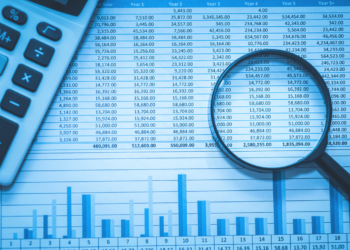Accountants are typically thought of as tax preparers, auditors or corporate controllers; however, many fall under the category of forensic accountant. Forensic accounting generally involves the application of specialized knowledge and investigative skills possessed by CPAs to collect, analyze and evaluate evidential matter and to interpret and communicate findings in a courtroom or other venue. Because forensic accountants have a specialized set of skills, they can serve as a valuable team member in a litigation case.
In a litigation case, attorneys often analyze large amounts of complex and detailed information that must be summarized for presentation to a judge or jury. So how can a forensic accountant assist in this process? Accountants are also in the practice of taking large amounts of complex and detailed data and summarizing it. Think of financial statements, which are a summary of thousands or even millions of transactions that occur over a period of time. Financial statements allow a reader to see a complex business in a simple format that can be used as a valuable management or investment decision tool. In a litigation matter, a forensic accountant can be counted on to analyze large amounts of complex and detailed financial data to demonstrate damages or to rebut an opposing expert’s findings. The findings will be summarized in a report, trial graphics and exhibits that can become a valuable part of a case. In addition, many forensic accountants have experience with litigation matters and can be called upon to testify in support of their findings.
Because some forensic accountants are experienced in litigation matters, they are also familiar with the process. They can be engaged as a consultant or as a testifying expert witness and can assist with discovery, depositions and development of trial strategies.
The following is a listing of some of the types of engagements in which forensic accountants have experience:
Business Valuations – Forensic accountants can assist in the valuation of a business for use in divorce cases, sale of a business, tax planning, estate planning, applications for financing and shareholder disputes.
Personal Injury Claims – These cases involve the review of an injured party’s financial situation to determine the extent of damages suffered from wrongful death, injury, discrimination or other events.
Intellectual Property – Forensic accountants can assist with these cases by analyzing loss of profits sustained by an injured party or profits unjustly earned by an adverse party. In addition, they can assist with a review of reasonable royalties.
Shareholder Disputes – These cases involve disputes regarding breach of duties that affect the profitability and financial well-being of a business. Forensic accountants can assist in reviewing financial statements and shareholder agreements, tracing assets and analyzing expenses.
Fidelity and Fraud Detection & Prevention – Forensic accountants can review employee embezzlement matters and analyze data to evaluate the extent of misappropriated funds. In addition, they can also provide investigative support and make recommendations to organizations looking to bolster their internal controls for fraud prevention, detection and compliance.
Financial Condition Analysis – This consists of a review of financial statements and other financial documents to evaluate the economic viability of a company or individual. This review can be an important part of a fraud or arson case to determine whether a financial motive exists.
Construction Claims – A forensic accountant can assist with construction defect, delay or bond claims. These cases involve a review of construction contracts, progress billings and job ledgers to verify incremental hard and softcosts as well as loss of profits. Forensic accountants often work closely with construction experts in these cases who can determine whether design issues or other situations impacted construction timelines.
When is the best time to engage a forensic accountant? Once it has been determined that a forensic accounting analysis may be needed, it is best to engage as early as possible. This allows the accountant the opportunity to better understand the facts of the case and fully understand what is required of them. A forensic accountant can also assist with the discovery process and with depositions of opposing financial witnesses or experts to assure that all relevant information is secured.
Some characteristics to look for in a forensic accountant are as follows:
- Strong written and oral communication skills.
- Prior experience in litigation matters.
- Resources to draw upon that will allow them to complete their analysis at an appropriate level of detail and within defined deadlines.
- Proper licensing and designations.
Next time you have a case that involves complex financial matters or even large amounts of data that need to be analyzed and summarized, consider the benefits of having a forensic accountant on your team. George Uhl









